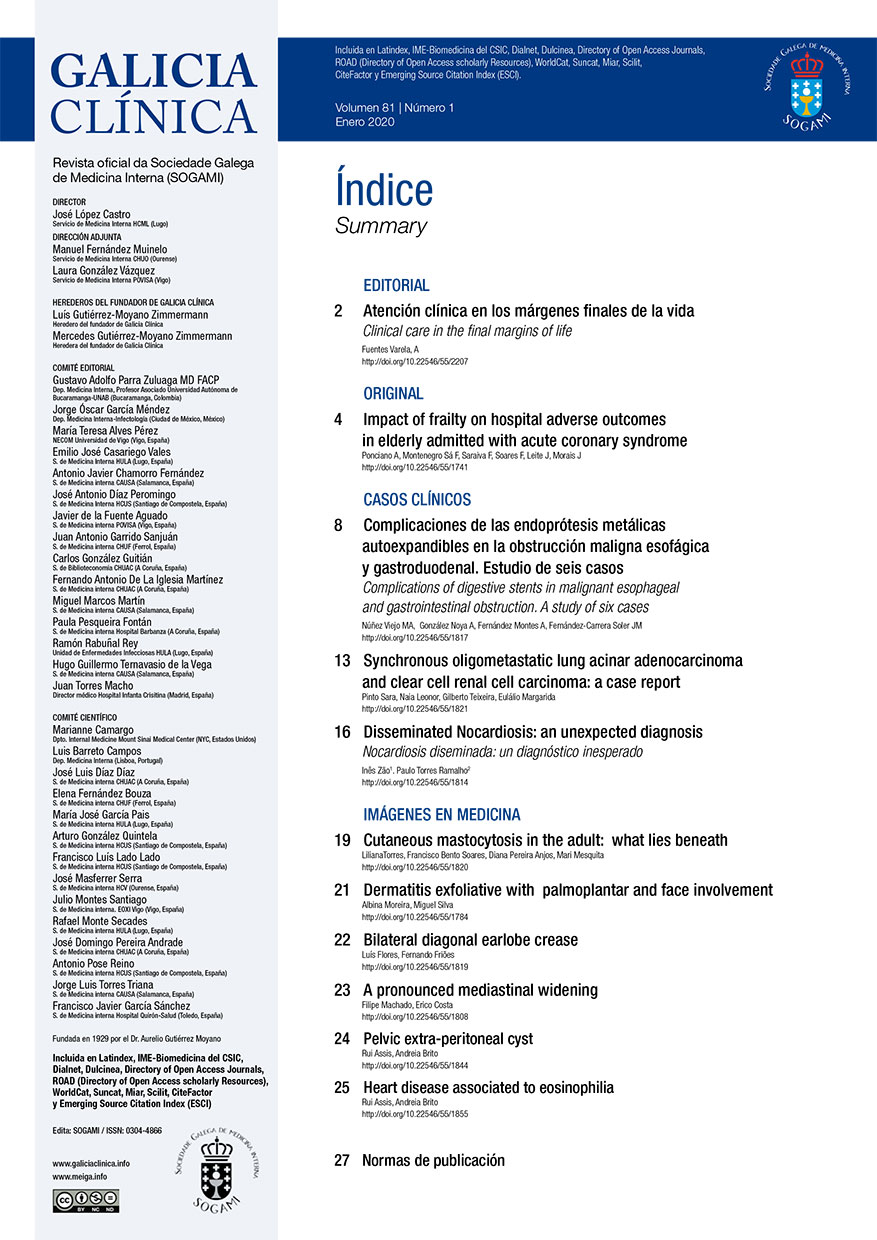Galicia Clínica by Sociedad Gallega de Medicina Interna is licensed under a Creative Commons Reconocimiento-NoComercial-SinObraDerivada 4.0 Internacional License.
Created from galiciaclinica.info.
Similar Articles
- Yoana Besteiro Balado, Juan Carlos Piñeiro Fernández, Andrea López López, Acute recurrent autoinflammatory myopericarditis: from pathophysiology to practice , Galicia Clínica: Vol. 83 No. 4 (2022): Galicia Clinica - Official Journal of the SOGAMI
- Anabela Brito , Paula Dias, Takotsubo cardiomiopathy , Galicia Clínica: Vol. 79 No. 4 (2018): Galicia Clinica - Official Journal of the SOGAMI
- Miguel Silva, Eduarda Pena, Margarida Oliveira, Daniela Carvalho, Lemierre's syndrome with acute respiratory distress syndrome , Galicia Clínica: Vol. 82 No. 2 (2021): Galicia Clinica - Official Journal of the SOGAMI
- Ana Cristina Pereira Martins, Pedro Ribeiro, Transurethral Resection of the Prostate Syndrome: A Case Report , Galicia Clínica: Vol. 81 No. 3 (2020): Galicia Clinica - Official Journal of the SOGAMI
- Carolina Ourique, Filipa Gomes, Paraneoplastic Acrokeratosis (Bazex Syndrome) associated with lung adenocarcinoma , Galicia Clínica: Vol. 78 No. 3 (2017): Galicia Clinica - Official Journal of the SOGAMI
- Telma Elias, Ana Clara Dinis, Cátia Gorgulho, Allopurinol-induced DRESS syndrome triggered by COVID-19 , Galicia Clínica: Vol. 82 No. 3 (2021): Galicia Clinica - Official Journal of the SOGAMI
- Miguel Pires, Joana Monteiro, Sonia Chan, Luisa Pinto, Miller Fisher Syndrome - A Case Report , Galicia Clínica: Vol. 79 No. 4 (2018): Galicia Clinica - Official Journal of the SOGAMI
- Pedro Oliveira, Paula Ferreira, Gustavo Rocha, Neuroendocrine Tumor, diagnostic difficulties , Galicia Clínica: Vol. 78 No. 2 (2017): Galicia Clinica - Official Journal of the SOGAMI
- Joana Cascais Costa, Cátia Pereira, Ramsay Hunt syndrome: an uncommon presentation in an immunocompetent patient , Galicia Clínica: Vol. 79 No. 1 (2018): Galicia Clinica - Official Journal of the SOGAMI
- Márcia Cravo, Daniela Barroso, Fabienne Gonçalves, Scleroderma renal crisis: a rare life-threatening cause of hypertension , Galicia Clínica: Vol. 82 No. 3 (2021): Galicia Clinica - Official Journal of the SOGAMI
You may also start an advanced similarity search for this article.
Most read articles by the same author(s)
- Sónia Santos, Ana Ponciano, Joana Raquel Monteiro, Fernanda Pinhal, José Leite, Célio Fernandes, Sepsis – Retrospective Observational Study of Sepsis and Septic Shock treated in internal medicine wards , Galicia Clínica: Vol. 81 No. 3 (2020): Galicia Clinica - Official Journal of the SOGAMI
- José Leite, José Cardoso, José Almeida, Daniela Marado, Undetermined febrile syndrome and panniculitis - a rare case of subcutaneous panniculitis-like T-cell lymphoma , Galicia Clínica: Vol. 82 No. 1 (2021): Galicia Clinica - Official Journal of the SOGAMI
- Diana Gonçalves, José Leite, Maria Julião, Dilva Silva, An unusual case of parotid gland B-cell lymphoma complicating Sjögren Syndrome , Galicia Clínica: Vol. 81 No. 4 (2020): Galicia Clinica - Official Journal of the SOGAMI


